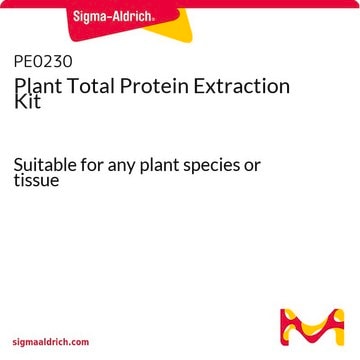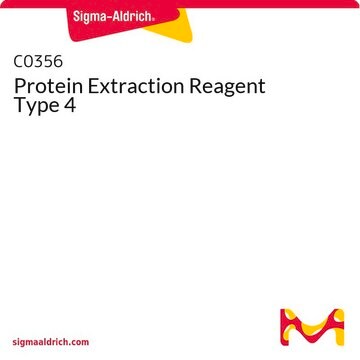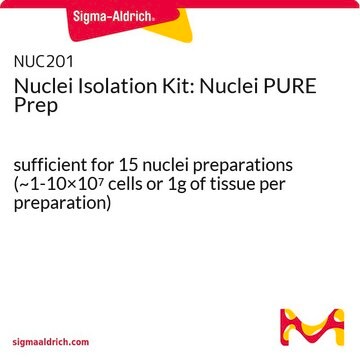PE0240
Plant Fractionated Protein Extraction Kit
Suitable for any plant species or tissue
About This Item
Productos recomendados
uso
sufficient for 20 extractions
temp. de almacenamiento
−20°C
Descripción general
Following removal of polyphenolics, tannins and other interfering substances, ground plant tissue, fresh or frozen, is resuspended in a specially formulated reagent to extract hydrophilic proteins. After sequential extractions of hydrophilic proteins, addition of the chaotropic reagent provided extracts hydrophobic membrane bound proteins. Plant debris is pelleted by centrifugation and protein extract solutions are collected. The end results are qualitative fractionated protein samples, ready for downstream proteomic analysis.
Los componentes del kit también están disponibles por separado
- Plant Protein Extraction Reagent Type 1 1 bottle
- C0356Protein Extraction Reagent Type 4 1 bottleSDS
- P9599Protease Inhibitor Cocktail, for plant cell and tissue extracts, DMSO solution 3 x 1SDS
- T7567Tributylphosphine solution, 200 mM (in N-methyl-2-pyrrolidinone), liquid 3 x 0.5SDS
- A3221Iodoacetamide, Single use vial of 56 mg 3 vial(s)SDS
Palabra de señalización
Danger
Frases de peligro
Consejos de prudencia
Clasificaciones de peligro
Acute Tox. 3 Oral - Aquatic Chronic 2 - Carc. 2 - Eye Dam. 1 - Repr. 1B - Resp. Sens. 1 - Skin Corr. 1A - Skin Sens. 1 - STOT SE 3
Órganos de actuación
Respiratory system
Código de clase de almacenamiento
6.1C - Combustible acute toxic Cat.3 / toxic compounds or compounds which causing chronic effects
Certificados de análisis (COA)
Busque Certificados de análisis (COA) introduciendo el número de lote del producto. Los números de lote se encuentran en la etiqueta del producto después de las palabras «Lot» o «Batch»
¿Ya tiene este producto?
Encuentre la documentación para los productos que ha comprado recientemente en la Biblioteca de documentos.
Los clientes también vieron
Nuestro equipo de científicos tiene experiencia en todas las áreas de investigación: Ciencias de la vida, Ciencia de los materiales, Síntesis química, Cromatografía, Analítica y muchas otras.
Póngase en contacto con el Servicio técnico














